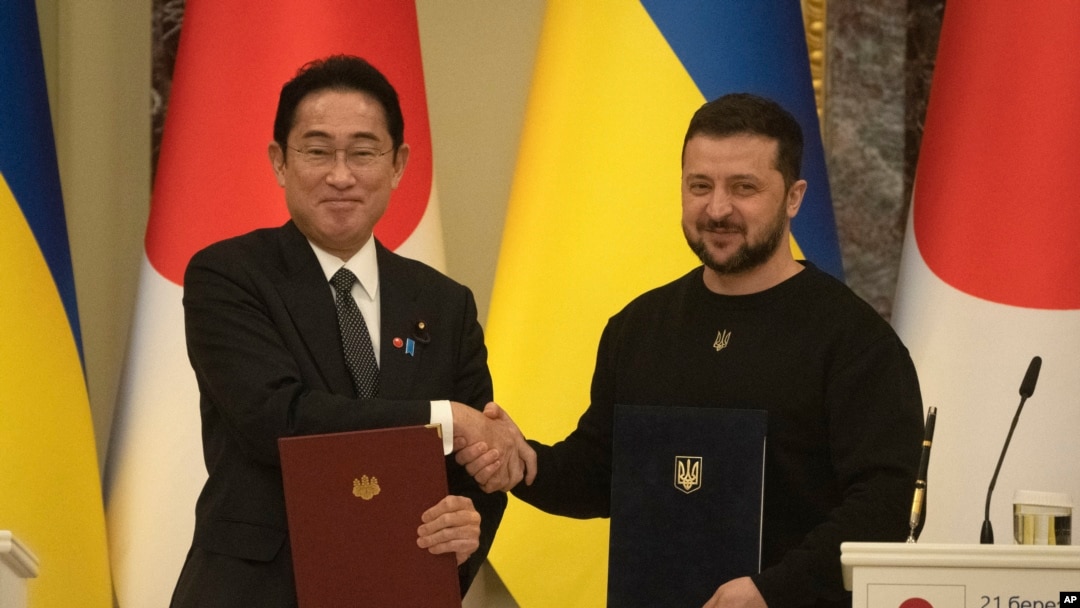Ukrainian President Volodymyr Zelenskyy will join leaders of the Group of Seven wealthy democracies in Hiroshima, Japan, Zelenskyy's farthest trip from his war-torn country, as G-7 members pledge to bring "comprehensive, just and lasting peace in Ukraine."
Zelenskyy had been expected to address the group by videolink Sunday but Ukrainian National Security and Defense Council Secretary Oleksiy Danilov, speaking on national television, confirmed Zelenskyy would attend the summit.
"Very important matters will be decided there and therefore the physical presence of our president is an absolutely important thing in order to defend our interests," he said.
Confirmation of Zelenskyy's attendance came as G-7 leaders from the United States, Canada, France, Germany, Italy, the United Kingdom, Japan and the European Union, reaffirmed their "commitment to stand together against Russia's illegal, unjustifiable, and unprovoked war of aggression against Ukraine."
In a statement, the group pledged to "mobilize all our policy instruments and, together with Ukraine, make every effort to bring a comprehensive, just and lasting peace in Ukraine as soon as possible," underscoring that it cannot be realized without "the complete and unconditional withdrawal of Russian troops."
SEE ALSO: G7 Leaders Likely to Focus on Ukraine, Tensions in Asia at Summit in HiroshimaNew sanctions
G-7 leaders unveiled tough new sanctions designed to close loopholes and go after previously untouched industry sectors. The U.S. sanctions alone would blacklist about 70 Russian and third-country entities involved in Moscow's defense production, in addition to sanctioning more than 300 individuals, entities, aircraft and vessels. The United Kingdom is putting a ban on Russian diamonds, copper, aluminum, and nickel.
SEE ALSO: G7 to Increase Financial Pressure on RussiaAiming to strengthen cooperation for a "Free and Open Indo-Pacific," G-7 leaders will also focus on countering what the group calls China's "economic coercion," the use of punitive trade practices for political goals.
In a Thursday briefing to reporters a senior administration official said that G-7 leaders are aligned in their goal of "de-risking" or limiting reliance and vulnerability on China, increasing supply chain resilience, protecting sensitive technology and concerns around Beijing's "nonmarket policies and practices."
However, agreeing on a common approach to deal with China will be challenging. The world's second-largest economy and global manufacturing hub is an important trade partner to G-7 members.
Kicking off their meetings, leaders laid wreaths at the Hiroshima Peace Memorial Museum to honor victims of the atomic bomb that U.S. forces dropped during World War II, killing more than 130,000.
A group of nonmembers have also been invited as part of Japanese Prime Minister Fumio Kishida's effort to engage with the Global South. Those nations include Australia, Brazil, Comoros, Cook Islands, India, Indonesia, South Korea, Ukraine and Vietnam.
The summit is overshadowed by a monthslong impasse between the White House and congressional Republicans over raising the debt ceiling to keep the U.S. from defaulting on its obligations.
"These leaders understand how important American leadership is around the world," National Security Council spokesman. John Kirby told VOA in an interview Friday. "And they know that that leadership, that credibility, could be hurt if we default," he said.


